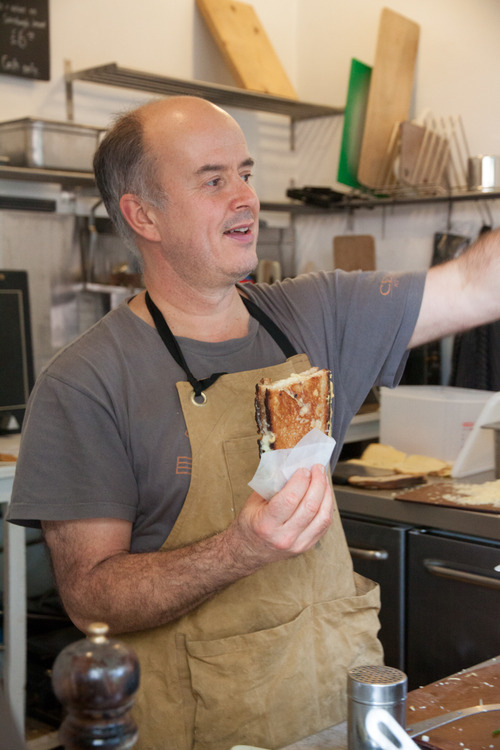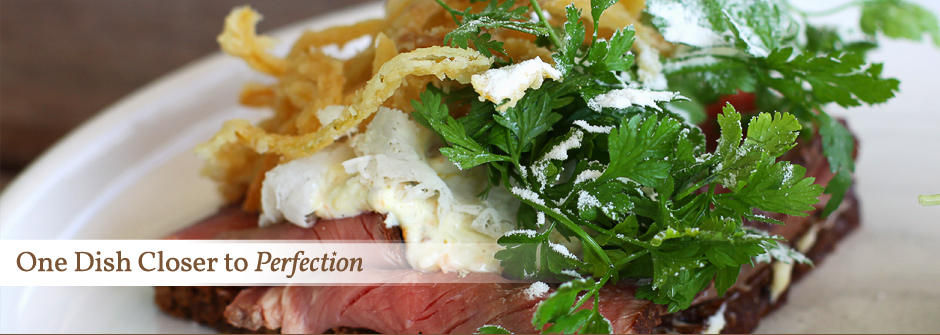I am what I eat: Bill Oglethorpe
 Tuesday, January 10, 2017 at 8:41PM
Tuesday, January 10, 2017 at 8:41PM 
This post first appeared on the Borough Market website as part of my series, I Am What I Eat, where I explore the links between food and identity, interviewing traders about the foods that are important to them and why. In the second series I chose to speak to Bill because I knew his path into cheese-making had been an interesting one. Actually, we ended up talking a lot about food science, in particular transformations, and this instead became the focus of my article.
“I’ve always been interested in anything to do with transformation,” says Bill Oglethorpe, owner of Kappacasein Dairy. “It’s kind of magical. Like mayonnaise, the emulsification of egg yolks and oil – that’s amazing – turning something that’s oily and separated into something that’s creamy. Or béchamel or soufflé…”
Or cheese, one might add – he doesn’t say it, but it’s implicit. Bill has worked with cheese for over 20 years. He started on the shop floor at Neal’s Yard Dairy and gradually moved into affinage, the aging and maturing of cheese, arguably one of the most important transformative processes in cheese making. In 2008 he started Kappacasein Dairy, producing cheese in a railway arch in Bermondsey with milk that he collects from the Common Work Organic Farm in Kent.
In his book Cooked, Michael Pollan tells us that in ancient Greece the word for ‘cook’ was mageiros, sharing its etymology with the word for ‘magic’. “Even the most ordinary dish follows a satisfying arc of transformation, magically becoming something more than the sum of its ordinary parts".
Pollan adds that “in almost every dish you can find … the ingredients of a story: a beginning, a middle, and an end.” Cheese became the chief ingredient in Bill’s life story. Born in Zambia, he moved to Switzerland aged 18 to attend an agricultural college in the Swiss Alps. The main focus there was milk production and they used to visit local cheese producers as part of the course.

Knowing this history, I am surprised to learn that he could just as easily have ended up working with bread. “Sourdough bread is one of the most amazing transformations,” Bill tells me, “with the bacteria in the environment feeding on starch and creating gas, which makes the bread rise.” When he arrived in London he applied to both Neal’s Yard Dairy and Neal’s Yard Bakery, but he got the job in the dairy and that cemented it.
Bill doesn’t have a scientific background, but he is extremely well read on food science. I have known Bill for several years now and I have always been impressed by the casual references that pepper his conversation. He tells me about a book he read recently called Umami, where he learned that after four months of cheese maturing, there is a huge increase in glutamates, which create the umami flavour. “I knew that something happened after four months, but I didn’t have an explanation for that. That book had a big impact on me.”
Bill doesn’t read passively, he implements what he learns both in his cheese making and in his daily life. “It’s like research and development, you’re finding out what works”. He enjoys working with cheese “because it’s a living product; the transformation of the cheese relies on natural mechanisms with the flora in the milk, which I find really satisfying.”
Recently he has been experimenting with fasting after reading Healing with Whole Foods by Paul Pitchford. He is interested in how food transforms into energy once consumed. “It makes you realise how demanding food is on you. You think food is there to give you energy, but it also takes a lot of energy to transform and when you fast you feel much lighter, less sluggish.”

He has also found that food tastes better after depriving himself and this got him thinking about how one’s perception of food can change depending on one’s state of mind. “If you’re super preoccupied or stressed, you just don’t feel things. I often wondered why I enjoyed this meal and I didn’t enjoy that meal when it was the same stuff. Depends how you felt, the people you were with, were you relaxed, if you were stressed out.”
The context is also important. “Small things like how a table is set or how the food is given to you can make your experience feel different. Or maybe the person who served you didn’t look at you or seemed distracted and you don’t enjoy the food. Maybe the food was OK, but it’s the whole experience.”
Of all the transformations in cooking, it is fermentation that interests Michael Pollan most of all; “the brewer and the baker, the pickler and cheese maker all find themselves engaging in a lively conversation with nature.” This eloquent description sums up why, for me, Bill embodies what this series is all about.
Food informs every aspect of Bill's life – it is his work, his hobby, his passion. He is fascinated by the way that humans interact with nature and he has used food science as a way to explore this both in his cheese room and in his daily life. He loves working with cheese because “it is one of those engaging things. It feels alive.”
Food is Bill's life story. It drives his on-going conversation with life, the universe and everything.
 You can read Bill's recipe for his Dad's cheese soufflé here or on the Borough Market website.
You can read Bill's recipe for his Dad's cheese soufflé here or on the Borough Market website.
 Vix |
Vix |  Post a Comment |
Post a Comment |  Borough Market,
Borough Market,  cheesemaker,
cheesemaker,  transformations in
transformations in  Identity
Identity 
Reader Comments